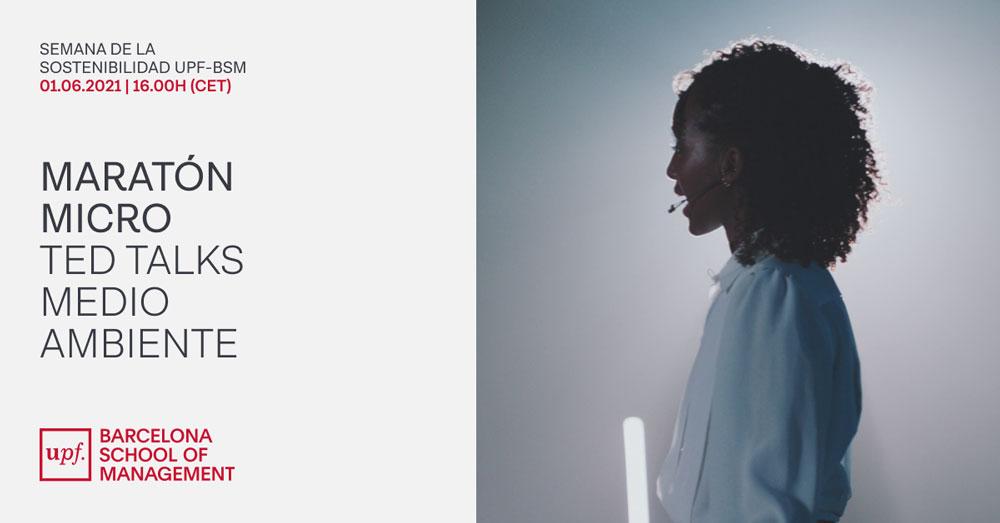Micro TED Talks Environment: small individual changes for a better world
1 Junio - 2021
"Be the change you want to see in the world" is one of the famous phrases of the thinker Mahatma Gandhi and one of the most repeated among the 10 people who participated in the Micro TED Talks Marathon organized by the UPF Barcelona School of Management as part of World Environment Day.
During the session, students and former students of the school who have a great awareness of the climate emergency and a proactive attitude in the environmental cause have spoken.
Fashion is the second most polluting industry
"Only if we do a little better as a society we will be more sustainable," said Sònia Flotats, CEO of So Good So Cool and alumni of the Postgraduate Course in Management of Social Responsibility (CSR). " Fashion is the second most polluting industry, that's why the small changes we can make as individuals are so important," said Flotats, who emphasized the importance of "repairing and not throwing away".
63% of clothing ends up destroyed without being reused
Vincenzo Rusciano, CEO of Youkala and alumni of the Executive MBA, also endorsed this idea, pointing out that "63% of clothing ends up destroyed without being reused". Indeed, another fact that the speakers mentioned is that 65% of the clothes we throw away are burned and end up in landfills.
How to reverse this situation? Eduard Mas, student of the Master in Digital Marketing Management and Product Manager of Reprotect has opted for rethinking the "production processes".
A circular world
The recommendations of the three voices that have focused their speeches on the fashion industry have been closely linked to the circular economy, a concept that has also been embraced by other participants such as Xavier Ribera, Director of Communication, Institutional Relations and Sustainability at BASF and alumni of the Postgraduate Course in Corporate Communication.
"The future will be circular or it won't be," said Ribera, who highlighted the role that the chemical industry can play in achieving a sustainable future. "Without science we will not succeed in the transition to a better world," he predicted.
We must change the lineal model that has guided us in recent years towards a circular, more efficient and resilient one
In this sense, Josep Maria Canyelles, president of Territori Socialment Responsable (TSR) and alumni of the Master in Public and Social Policy, explored the key actors to meet the requirements of the 2030 Agenda. "It must be approached from governments and companies, but also from the citizenry," he said, adding, "Change in the environmental sphere will not be possible if aspects such as the community are not worked on in parallel."
In any case, Sandra Costa, Sustainability, Climate Change and CSR consultant at KPMG Spain and alumni of the Postgraduate Course in CSR Management, was very clear: "There is a need to change the linear model that has guided us in recent years towards a circular, more efficient and resilient one".
Change is individual
"The reality is that if humanity is not brave and does not go against what is established, the ship will not have enough time to turn and avoid the crash," warned Oscar Benítez, expert in Environmental Crime Investigation and alumni of the Postgraduate Course in Compliance. Under this premise, there are many small actions that individuals can take to bring about change.
If humanity is not brave and does not go against what is established, the ship will not have enough time to turn and avoid the crash
One of these examples is "Recover an olive tree", the initiative presented by Alberto Alfonso Pordomingo, alumni of the Postgraduate Course in Compliance and Co-Founder of Apadrinaunolivo.org. It is a project that aims to "give a second life to the rural environment and combat the phenomenon of empty Spain", said Alfonso, who commented that the "lack of generational replacement" in the rural and agricultural environment is "worrying".
"We only have one planet and we must do our bit, however small," reminded Mª Carmen de Bernardo, freelance translator and student of the Postgraduate Course in Literary Translation, who gave a speech on "home and environmental sustainability".
Although small changes make a difference, large corporations, government institutions and economic stakeholders must drive this change, since, as Diana Casajus, internal auditor at VidaCaixa and alumni of the Postgraduate Course in CSR Management, has argued, "the financial sector plays a key role in ensuring that capital flows are linked to more respectful activities".
